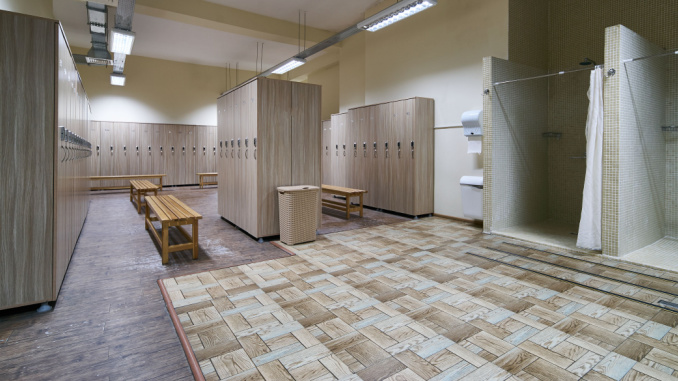
by Staff Reporter | Mar 19, 2025 | News
By Staff Reporter |
Senator Mark Kelly defended the foreign terrorist sympathizer deported recently by the Trump administration: Dr. Rasha Alawieh, a Lebanese kidney transplant specialist and Brown University professor.
Kelly described Alawieh to constituents as a “talented transplant doctor” and a “lawful H1B visa holder” during a town hall on Monday. Kelly failed to mention Alawieh was deported for attending the funeral of terrorist Hassan Nasrallah — Hezbollah’s late longtime leader — and defending the terrorist to immigration agents. Instead, Kelly alleged her deportation had no justification.
“She was tossed out of the country because she visited some relatives in, I think, Lebanon, or somewhere. So, thrown out without cause, without due process. So we’re up against an administration that does not follow the rules, I think it’s very fair to say, and in some cases breaking laws,” said Kelly.
The Department of Homeland Security (DHS) explained Alawieh was deported for openly admitting her support of Nassrallah to Customs and Border Protection (CBP) officers. Alawieh was in the country as a kidney transplant specialist.
“A visa is a privilege not a right—glorifying and supporting terrorists who kill Americans is grounds for visa issuance to be denied. This is commonsense security,” stated DHS.
Court documents revealed Alawieh had photos supportive of Nasrallah along with Iran’s leader, Ayatollah Ali Khamenei, on her phone. Alawieh’s legal counsel withdrew recently from her case, citing “further diligence” as their cause for dropping her as a client.
“Dr. Alawieh stated that Nasrallah is the leader of Hezbollah and as a Shia Muslim, he is highly regarded in the Shia community as a religious figure,” stated the prosecutors. “According to Dr. Alawieh, she follows him for his religious and spiritual teachings and not his politics.”
Kelly made the remarks during a town hall with fellow Senator Ruben Gallego on Monday.
The pair came home this week to disseminate their Democratic leadership’s talking points criticizing the House Republican-led budget as a threat to Medicaid.
House Republicans’ proposed budget (HCR 14) looks to reduce spending by $880 billion. The House approved the plan last month. In response, House Minority Leader Hakeem Jeffries claimed the budget plan would issue “the largest cut to Medicaid in American history,” since the committee charged by the proposed budget to find cuts, the House Energy and Commerce Committee, mainly oversees Medicaid funding (93 percent of its oversight, per the Congressional Budget Office).
House Republicans contested the Democrats’ claim, arguing the budget plan doesn’t mention Medicaid.
While Kelly admitted the mass cancellations of Medicaid hadn’t occurred yet, he said it was a “high probability.” Kelly said Trump’s “giant tax cut” benefited “millionaires and billionaires” mainly.
“All of this stuff you’re hearing every single day is so they give a big giant tax cut to people who don’t need a tax cut. We can raise the taxes of billionaires, and they will still be billionaires, and that’s what we should be doing, we shouldn’t be cutting these services” said Kelly.
Kelly predicted the Trump administration’s changes to Medicaid and Medicare would include additional red tape that would prevent people from getting on or staying on Medicaid, and possibly cutting the match funding number for states.
With reduced or eliminated Medicaid and Medicare, Kelly predicted people would “get sicker” and come to rely on emergency room visits as their primary form of health care, consequently driving up health care costs. Gallego echoed this assessment.
“You will see these emergency rooms become the primary care doctors,” said Gallego.
“This hasn’t happened yet, and it’s possible we can prevent it from happening,” said Kelly.
Kelly proposed expanding access to Medicaid and Medicare as well as increasing taxes on the wealthy as the remedies for reducing health care costs.
According to the Centers for Medicare and Medicaid Services (CMS), Arizona has about 780,000 individuals enrolled in Medicare and over 483,000 enrolled in a prescription drug plan only out of over 1.5 million individuals recorded as Medicare eligible in the state.
“There’s no way they can get to those tax cuts without Medicaid. The math doesn’t math,” said Gallego.
Gallego said he thought Republicans were “dumb enough” to go after Medicaid, but perhaps not Medicare.
“In order for them to cut $850 billion from a very narrow slice, that means they’re going to have to go deep,” said Gallego.
Kelly disagreed, saying Republicans were “dumb enough” to go after Medicare.
Gallego predicted certain working families above the federal poverty line but still within Arizona eligibility levels would be cut from Medicaid.
Gallego and Kelly encouraged a mass grassroots response to oppose the Trump administration.
AZ Free News is your #1 source for Arizona news and politics. You can send us news tips using this link.

by Jonathan Eberle | Mar 19, 2025 | Economy, News
By Jonathan Eberle |
A proposed amendment to Arizona’s tax laws could make it significantly harder for cities and counties to raise taxes and fees. Senate Concurrent Resolution (SCR) 1008, sponsored by Senate President Warren Petersen, proposes requiring a two-thirds majority vote from municipal and county governing bodies before they can increase assessments, taxes, or fees.
SCR 1008 builds upon Arizona’s existing tax-related voting requirements. In 1992, Proposition 108 established that any net increase in state revenue—including tax hikes or new fees—requires a two-thirds vote in both chambers of the state legislature. More recently, Proposition 132, passed in 2022, mandated that any tax-related ballot initiative or referendum must receive at least 60% voter approval to become law.
Currently, municipal and county governments must provide a 60-day public notice before imposing new business taxes or fees. However, SCR 1008 would go further by requiring a supermajority vote at the local level before such increases could be enacted.
Key provisions of SCR 1008 include:
- A two-thirds vote by a city’s common council would be required to increase any assessment, tax, or fee.
- A two-thirds vote by a county’s board of supervisors would be required for similar increases.
- The measure declares tax and fee regulation a statewide concern, limiting the ability of local governments to adopt different rules.
- The proposal must be approved by voters in the next general election before becoming law.
If approved by the legislature, the measure would head to the ballot for voters to decide its ultimate fate.
SCR 1008 reflects ongoing efforts by Arizona lawmakers to place additional restrictions on tax increases at both the state and local levels. Supporters argue that requiring a supermajority vote will protect taxpayers from excessive government fees, while opponents contend it could limit the ability of local governments to fund critical services such as infrastructure, public safety, and education.
The bill narrowly passed the Senate Government Committee with a 4-3 vote and now awaits further legislative consideration.
If approved by voters, SCR 1008 would significantly change the way local governments in Arizona raise revenue, ensuring that any tax or fee increase has broad political support before becoming law.
Jonathan Eberle is a reporter for AZ Free News. You can send him news tips using this link.

by Jonathan Eberle | Mar 19, 2025 | News
By Jonathan Eberle |
A bill asking President Trump and Congress to prevent the Environmental Protection Agency (EPA) from imposing sanctions on Arizona is currently making its way through the Arizona legislature.
House Concurrent Memorial (HCM) 2010, sponsored by Rep. Michael Carbone (R-LD25) urges the federal government to prevent the EPA from imposing what lawmakers call “coercive and likely unconstitutional” penalties on Arizona regarding ozone pollution standards. The resolution also calls for maintaining the existing 2015 air quality standard rather than implementing stricter regulations.
The federal Clean Air Act requires the EPA to set and periodically review air quality standards to protect public health. In 2015, the EPA lowered the National Ambient Air Quality Standard for ground-level ozone to 70 parts per billion to reduce harmful pollution linked to respiratory illnesses. However, Arizona officials argue that some areas struggle to meet the standard due to factors beyond their control, such as emissions from outside the state or even outside the country.
The Arizona Department of Environmental Quality (ADEQ) is responsible for implementing and enforcing air quality regulations at the state level. Under federal law, state air quality plans must prevent emissions that significantly contribute to pollution in neighboring states or interfere with visibility protections.
The resolution, if passed, would formally request that:
- The President and Congress intervene to stop the EPA from penalizing Arizona for failing to meet ozone standards deemed unattainable with current technology.
- The EPA revise its regulations to allow Arizona’s air quality plan to account for cross-border emissions when determining compliance.
- The EPA maintain the 2015 ozone standard rather than implement stricter limits that the resolution claims lack sufficient scientific backing.
Additionally, the measure directs the Arizona Secretary of State to send copies of the memorial to federal officials, including the President, congressional leaders, and Arizona’s U.S. Senators and Representatives.
The measure passed the Arizona House with a 32-27-1 vote and was approved by the House Natural Resources, Energy & Water Committee in a 6-4 vote.
Supporters of the resolution argue that Arizona should not be penalized for ozone levels influenced by external sources beyond state control. If approved by the Legislature, HCM 2010 will serve as an official request for federal action but will not carry the force of law.
Jonathan Eberle is a reporter for AZ Free News. You can send him news tips using this link.

by Staff Reporter | Mar 18, 2025 | News
By Staff Reporter |
The Trump administration announced its plans for continuing construction of Arizona’s border wall over the weekend.
The continuance of the border wall is the latest in a series of efforts underway by the Trump administration to undo the consequences of former President Joe Biden’s open borders policies.
On Sunday, Department of Homeland Security (DHS) Secretary Kristi Noem announced the agency’s intent to construct seven miles of border wall where none exists along the Arizona border.
“As of today we’re starting seven new miles of construction,” said Noem. “We’re going to continue to make America safe again.”
Former President Joe Biden all but made good on his campaign promise to not build “another foot” of the border wall during his administration.
The Biden administration sold the parts necessary to complete the border wall in secret. The Pentagon took the profits of the sales.
In January, a federal court ruled against the Biden administration over its efforts to sell off as much of the border wall as possible prior to Trump taking office.
Under Biden, there were over 8.8 million southwest border encounters.
Around the time of Trump’s election last November, border encounters began to drop significantly. Encounters dropped 61 percent from November 2023 to last November, 68 percent from December 2023 to last December, and 65 percent from last January to this January.
During Trump’s first month in office (last month), border encounters dropped significantly further, returning to the low five digits.
Border encounters dropped by 93 percent from the February 2024 total, 92 percent from the February 2023 total, 93 percent from the February 2022 total, and 88 percent from the February 2021 total.
Last week, Customs and Border Protection (CBP) released the “CBP Home” mobile application. The free app allows individuals to “self-deport” by notifying the government of their intent to depart the country. It also enables individuals to check border wait times at legal ports of entry, apply for provisional I-94 entry, request an inspection of agriculture or biological products, and submit a travelers manifest for bus operators.
On Monday, Trump issued a proclamation invoking the Alien Enemies Act of 1798 to hasten deportations. The proclamation primarily addressed the foreign terrorist organizations Tren de Aragua, declaring the entity to be “undertaking hostile actions and conducting irregular warfare” against the nation. The proclamation allowed for the immediate apprehension, detention, and removal of terrorist organization members lacking citizenship, while also allowing Noem to apprehend and remove all other illegal immigrants as well.
“As President of the United States and Commander in Chief, it is my solemn duty to protect the American people from the devastating effects of this invasion,” stated the proclamation.
Trump defended his proclamation to reporters aboard Air Force One on Sunday, doubling down on his characterization of Biden’s border crisis as an “invasion” necessitating wartime measures.
“This is a time of war because Biden allowed millions of people, many of them criminals, many of them at the highest level. Other nations empty their jails into the United States,” he said. “It’s an invasion.”
AZ Free News is your #1 source for Arizona news and politics. You can send us news tips using this link.

by Matthew Holloway | Mar 18, 2025 | Education, News
By Matthew Holloway |
The Peoria Unified School Board (PUSD) has adopted new Student Privacy and Anti-Discrimination policies to provide “clarity on critical issues that have remained ambiguous in practice for years.”
Under the student privacy policy, the district aims to reaffirm “long-standing sex-based privacy standards,” and ensure that all multi-person restrooms, showers, and locker rooms in the district will be limited to use determined by biological sex while “allowing safe and reasonable accommodations for students who request additional privacy.” Under the expanded Anti-Discrimination policy, the district will include protections for pregnancy and parenting status, veteran status, genetic information, and define sex as biological sex in addition to maintaining its protections for individuals based on race, color, religion, sex, age, national origin, and disability.
A press release from PUSD explains that the new policies are “Rooted in the original intent of Title IX, which was enacted over 50 years ago to prohibit sex-based discrimination in federally funded education programs.” It added that the policies uphold “the principles of equal opportunity while recognizing inherent biological differences, particularly in athletics and privacy accommodations.”
“By adopting these standards, the Board ensures that students have access to a learning environment that respects their rights and privacy, while also shifting accommodation responsibilities back onto the district rather than placing the burden on other students.”
Board President Heather Rooks said in a statement, “As a member of the Peoria Unified School Board, I am committed to Leading with Excellence by ensuring the safety and privacy of every student. A strong Student Privacy Policy is not just a district priority—it is a community expectation. Parents and stakeholders trust us to create secure learning environments where students can thrive. This policy reflects the values of our district and the broader public. National surveys, including Rasmussen, consistently show that a majority of Americans support maintaining sex-based privacy standards in restrooms and locker rooms. Protecting student privacy is essential for their well-being and security.”
The PUSD policies have been a topic of contention on the school board since 2023 when the Governing Board voted to reject a motion to even draft such a policy as reported by AZ Free News. However, under the newly elected administration led by Rooks, the policies have been adopted in short order.
Rooks, fresh off of a U.S. District Court ruling against her lawsuit on biblical quotation during board meetings, has also said via her legal team that she intends to resume quoting Bible passages. Judge Michael Liburdi determined that emailed opinions of the school district’s attorney constitutes “legal advice to board members,” and not an action to prevent her from doing so.
First Liberty Institute, the legal organization representing Rooks told the outlet in a statement, “Heather plans to resume saying the Bible verses at the next board meeting, and appeal the district court’s ruling to ensure her speech remains protected.”
Matthew Holloway is a senior reporter for AZ Free News. Follow him on X for his latest stories, or email tips to Matthew@azfreenews.com.





